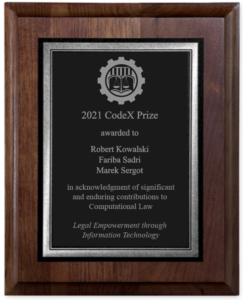New CodeX Prize Awarded to Computational Law Pioneers During 9th Annual CodeX FutureLaw Conference
STANFORD, CA, APRIL 8, 2021– CodeX – The Stanford Center for Legal Informatics announced the recipients of its inaugural CodeX Prize at today’s virtual CodeX FutureLaw 2021 Conference. CodeX FutureLaw is an annual conference that brings together researchers, engineers, entrepreneurs, lawyers, investors, and policy makers from around the world to focus on the way technology is changing the legal profession and the law itself, and the way these changes affect us all.
Inaugural CodeX Prize

The CodeX Prize is an annual award given to an individual or individuals for a noteworthy contribution to computational law — an idea, article, book, computer application, computer tool, organization, etc., that has had a significant and enduring positive impact on the field. This year’s CodeX Prize was awarded to Robert Kowalski, Fariba Sadri and Marek Sergot of Imperial College London in acknowledgment of their groundbreaking work on the application of logic programming to the formalization and analysis of the British Nationality Act. The authors’ seminal article, “The British Nationality Act as a Logic Program,” published in 1986 in the Communications of the ACM journal, is one of the first and best-known works in computational law, and one of the most widely-cited papers in the field.
CodeX’s emphasis is on the research and development of computational law — the branch of legal informatics concerned with the mechanization of legal reasoning. Computational law dates back to the 1970s and has since grown to incorporate other technological advances, such as widespread use of computers and the internet, and applying rules and regulations to legal cases without additional input from human legal experts.
“This journal article has had significant and lasting influence on the field,” said Michael Genesereth, Associate Professor of Computer Science; Associate Professor, by courtesy, of Law; and CodeX Research Director. “And, importantly, we continue to see the impact of this work today in rules-based AI systems such as automated medical diagnosis and fraud protection.”
The CodeX award was announced publicly in a short ceremony during this year’s CodeX FutureLaw conference. All award recipients attended the virtual ceremony, with Robert Kowalski accepting the award with a short speech.
Read a short Q&A with Robert Kowalski in the sidebar to this article.
CodeX FutureLaw
The 9th annual FutureLaw conference, with more than 1,500 registered participants including journalists, convened on April 8 for a full day to share knowledge and debate emerging issues in the legal technology landscape. Participants discussed not only the speculative future of technology in law and related fields, but the reality facing practitioners in a rapidly changing environment.
The conference included a discussion about state-of-the-art computable contracting with a panel moderated by Professor Harry Surden of University of Colorado School of Law. Panelists — Harry Surden, Professor of Law, University of Colorado; Oliver Goodenough, Professor of Law, Director of the Center for Legal Innovation, Vermont Law School; Carla L. Reyes, Assistant Professor of Law, Southern Methodist University Dedman School of Law; Mary-Anne Williams, Director of Disruptive Innovation at the University of Technology Sydney; Alexis Chun, Industry Director. Centre for Computational Law and Adjunct Faculty at the School of Law, Singapore Management University; John Cummins, Co-founder, Legal Technology Laboratory; and Michael Genesereth — clarified core computable contracting concepts and discussed key questions in the field. This discussion moved into a fireside chat with Roland Scharrer, AXA CTO; Michael S. Pieciak, Commissioner of the Vermont Department of Financial Regulation; and Dan Siciliano, CodeX Fellow about computable contracts in insurance.
The CodeX event also showcased a series of Law, Education and Experience (LEX) talks to advance discussion across numerous key areas, including computational law innovation in immigration, explainability for AI and law, computational antitrust, and the opportunity for diversity in LegalTech.
Keynote speaker – Alan Kay
FutureLaw also featured an opening keynote from Alan Kay, prominent computer scientist, Turing Award and Kyoto Prize winner, and Fellow of the American Academy of Arts and Sciences, the National Academy of Engineering, and the Royal Society of Arts. Kay is best known for his pioneering work on object-oriented programming and windowing graphical user interface (GUI) design. In 1972, he conceived the “Dynabook,” which he described as “a personal computer for children of all ages,” a predecessor of current laptops and tablets. Kay’s keynote discussion focused on natural human storytelling and its important impact on the development of human-centered design for computer frameworks.
Honoring Deborah Rhode

The final panel of the conference examined the real-world implications and impact of Professor Deborah Rhode’s scholarship in connection with the regulation of legal services, innovation, and access to justice. The panel was moderated by Nora Freeman Engstrom, Stanford Law Professor and newly-appointed, co-head of the Center for the Legal Profession (CLP), and included panelists Gillian Hadfield, Professor of Law and of Strategic Management, University of Toronto; Erin Levine, CEO and Founder of Hello Divorce; David Freeman Engstrom, Bernard D. Bergreen Faculty Scholar, Associate Dean, and Co-Director of the Center on the Legal Profession at Stanford Law School; and Ben Barton, Professor of Law, University of Tennessee.
Rhode, who passed away earlier this year, founded the CLP in 2008 to focus on issues critical to the future of the legal profession, including access to justice, diversity and inclusion, regulation of the bar, modernization of legal services, and lawyer leadership. The discussants reflected on Rhode’s immense body of work and reviewed the Center’s leading role in two current national efforts: the drive in numerous states to reform regulation of the legal services market in order to increase access to justice and the effort to better align the structural incentives facing law schools to promote affordable, accessible, high-quality legal education that trains students with the competencies they need to be effective in the 21st century.
The CodeX FutureLaw event was recorded. Session videos will be available on the CodeX playlist on YouTube, linking from codex.stanford.edu.
About CodeX
At CodeX – The Stanford Center for Legal Informatics, researchers, lawyers, entrepreneurs, and technologists work side by side to advance the frontier of legal technology, bringing new levels of legal efficiency, transparency, and access to legal systems around the world. CodeX‘s emphasis is on the research and development of computational law — the branch of legal informatics concerned with the mechanization of legal reasoning.
About Stanford Law School
Stanford Law School is one of the nation’s leading institutions for legal scholarship and education. Its alumni are among the most influential decision makers in law, politics, business, and high technology. Faculty members argue before the Supreme Court, testify before Congress, produce outstanding legal scholarship and empirical analysis, and contribute regularly to the nation’s press as legal and policy experts. Stanford Law School has established a model for legal education that provides rigorous interdisciplinary training, hands-on experience, global perspective, and focus on public service, spearheading a movement for change.
